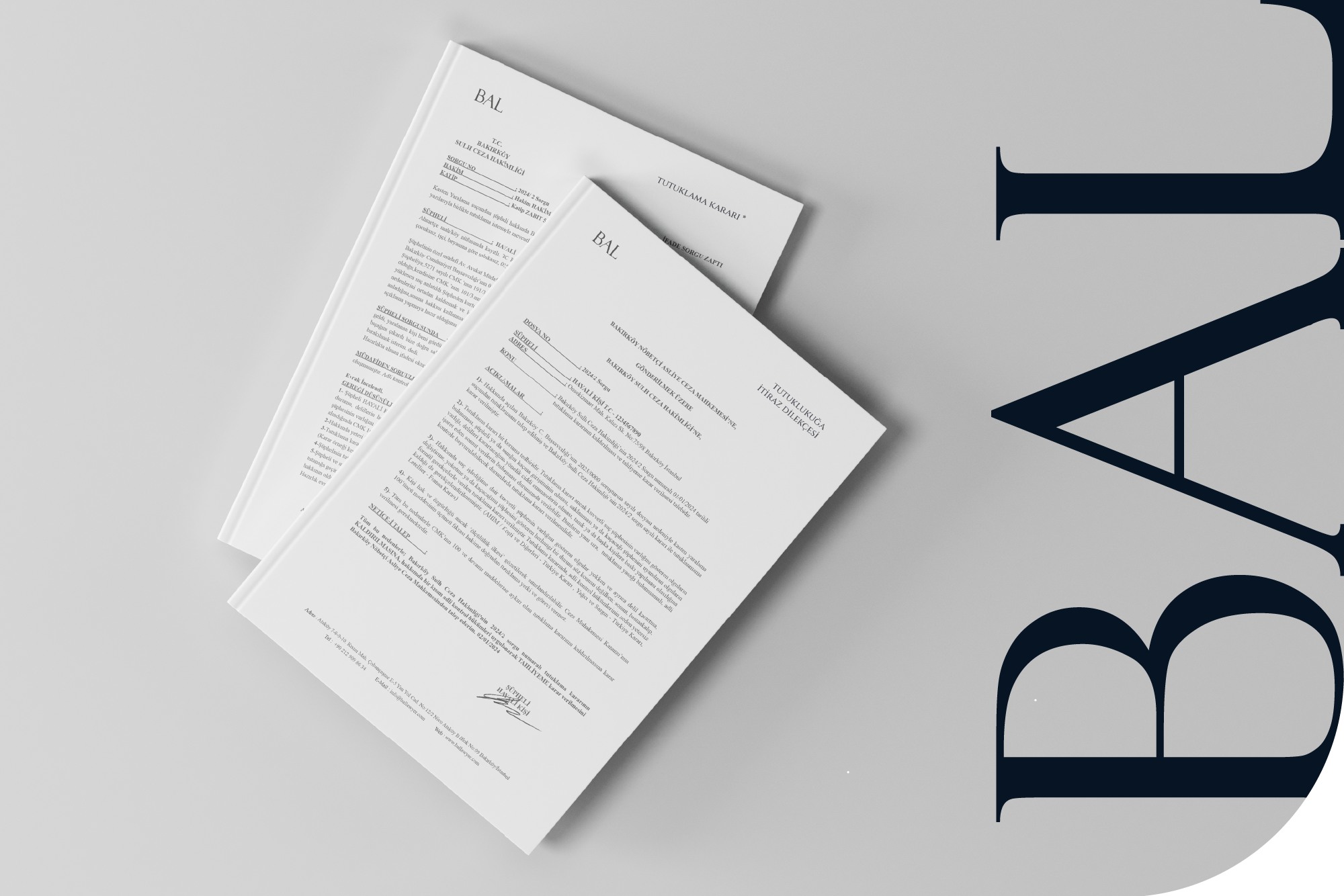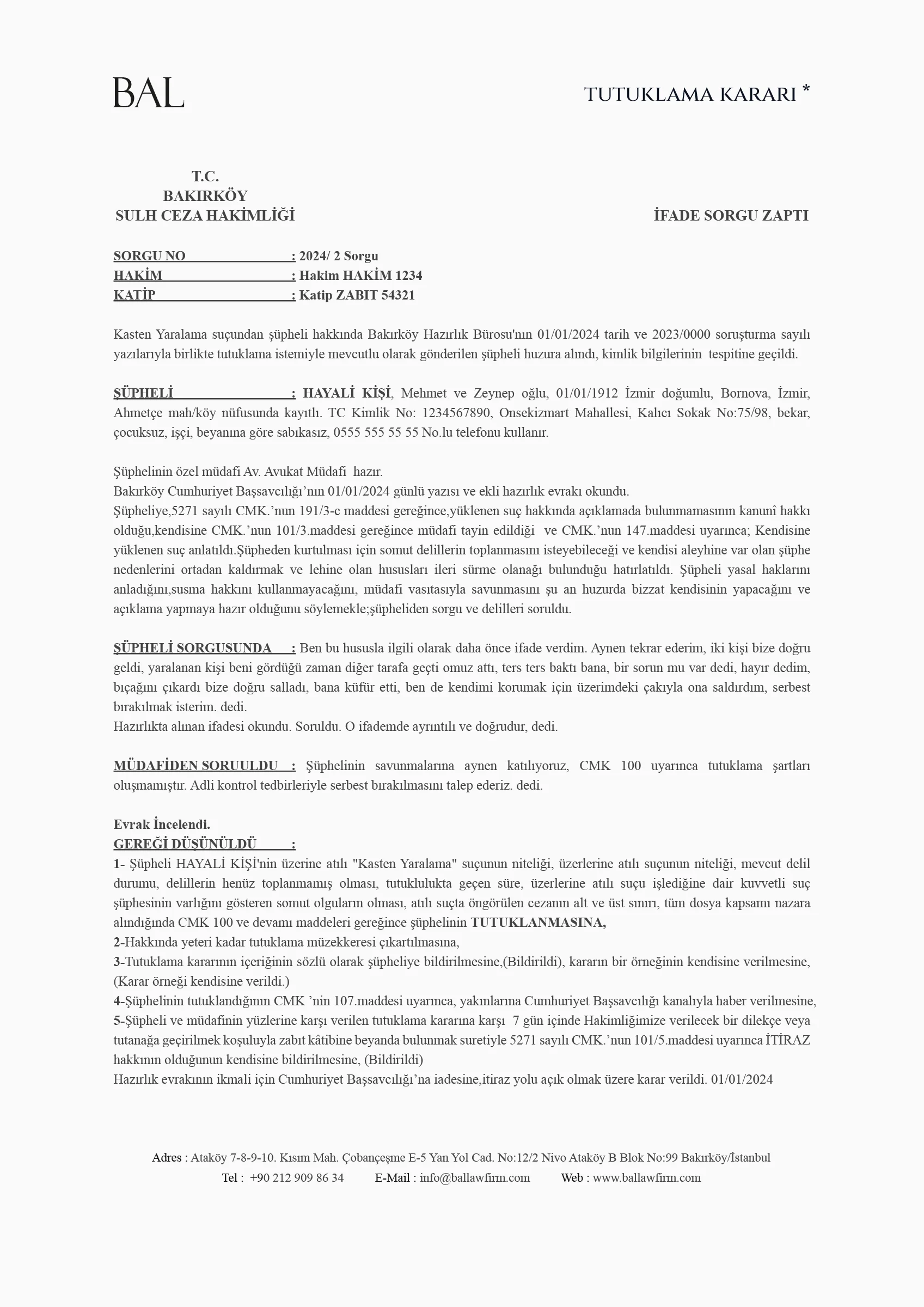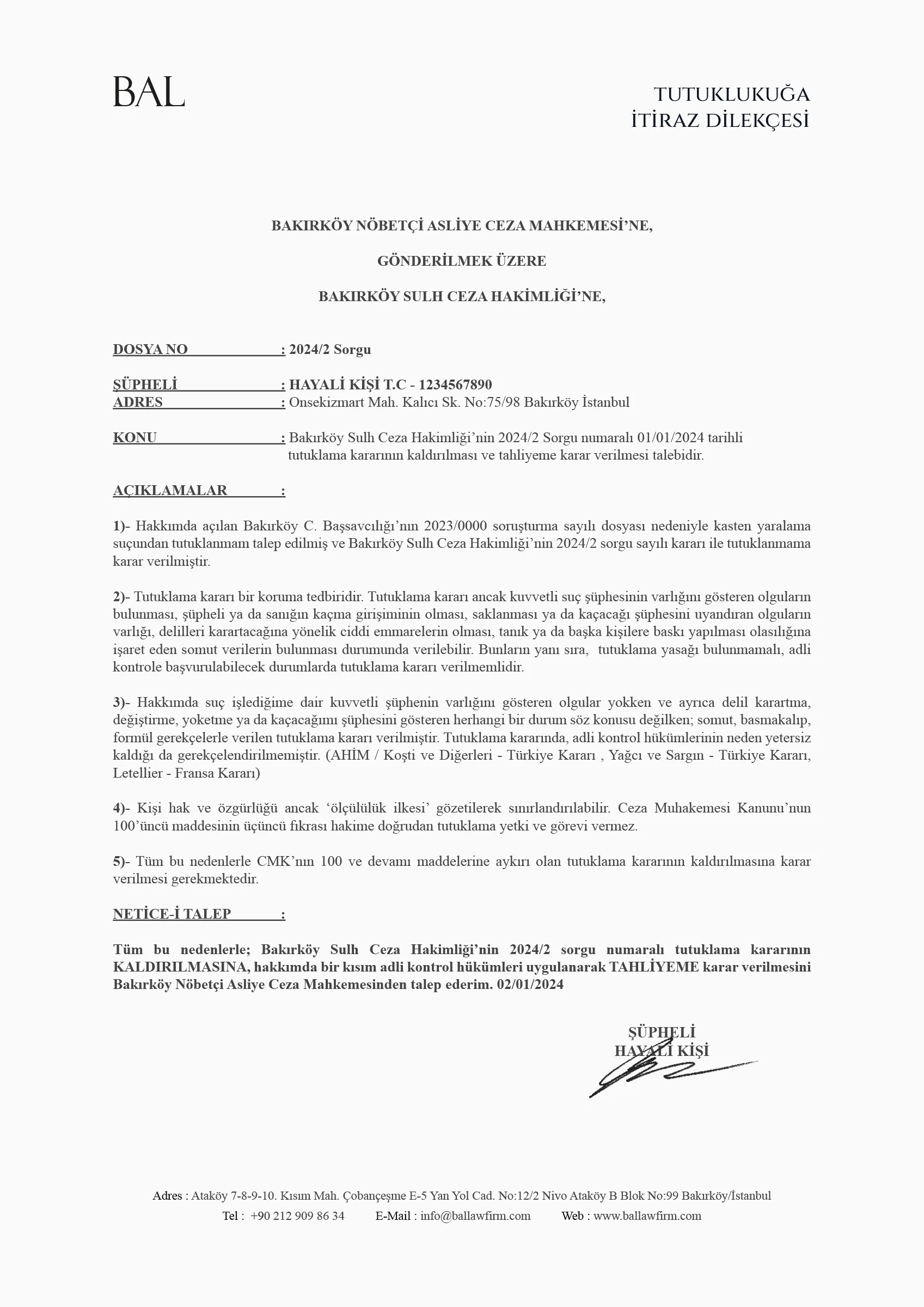
I. What is Arrest and Detention in Turkey?
Arrest is the restriction of the freedom of a person who is strongly suspected of committing a crime, regulated under Articles 100 to 108 of the Code of Criminal Procedure, in order to prevent him from escaping or obstructing evidence. It is a protection measure. Only a judge can make an arrest decision. During the investigation phase, the criminal judge of peace decides, and during the prosecution phase, the trial court makes the arrest decision. It is not yet proven that the person for whom an arrest warrant has been decided has committed the crime. For this reason, the person against whom an arrest warrant has been issued can request the annulment of the decision by submitting a ‘petition of objection to detention’.
1. What are the Conditions of Arrest?
Reasons for arrest are stated in Article 100 of the Code of Criminal Procedure; “If there are concrete facts that raise the suspicion that the suspect or the accused will flee, hide or escape. Behavior of the suspect or defendant; 1. Destroying, concealing or altering evidence, 2. Attempting to put pressure on witnesses, victims or others, if it creates strong suspicion about their facts.” It was ruled as follows. Detention is an exceptional protective measure.
Material conditions of arrest; It is the existence of concrete evidence showing the existence of a strong suspicion of crime and the reason for arrest. The formal conditions of the arrest are; There is no arrest ban, the condition of trial is met, the suspect or defendant is present, no security document is given, and there is a judge or court decision. Reasons for arrest;
- If the suspect is suspected of escaping,
- The behavior of the suspect or the accused, the possibility of destroying, concealing or altering evidence,
- It can be considered as the detainee putting pressure on witnesses, victims or others.
2. How Long Can the Detention Period Be in Turkey?
After the arrest decision, detention periods can be extended by decisions regarding the continuation of detention and the rejection of requests for release. As a rule, the detention period during the investigation phase cannot exceed one year for cases to be heard in the high criminal court. For cases to be heard in the criminal court of first instance, it cannot exceed six months. However, during the investigation phase, in the Turkish Penal Code;
- Crimes Against the Security of the State,
- Crimes Against the Constitutional Order and the Functioning of This Order,
- Crimes Against National Defense,
- The maximum period of detention for crimes within the scope of the Law on Crimes Against State Secrets, Espionage and Anti-Terrorism and crimes committed collectively is one year and six months. It can also be extended for another six months and people can be detained for 2 years.
During the prosecution phase, the period of detention in cases heard in the high criminal court can, as a rule, last a maximum of two years. In cases of necessity, this two-year period can be extended for 3 years. For the crimes listed above, it can be extended for 5 years. As a result, a person can be detained for a total of 5 years in the high criminal court, or 7 years if he is tried for the crimes listed above.
In cases that are not heard in the high criminal court, it may take a maximum of one year. However, this period can be extended for another six months and people can be detained for a maximum of 1 and a half years.
3. Review of Detention
It is necessary to check whether the conditions and reasons for the detention of a suspect or defendant who continues to be detained during the investigation or prosecution process still exist. During the investigation phase, the suspect’s detention is reviewed every thirty days by the criminal judge of peace.
During the investigation phase, if all the evidence has been collected and there is no suspicion of escape, the public prosecutor should be able to release the detainee, even if there is sufficient suspicion that he has committed the crime. Every decision regarding the continuation of detention has the force of a new arrest decision. During the prosecution phase, the detention review is carried out by the court where the trial is held.
II. What is a Petition to Object to Detention?
The arrest decision is stated in the second paragraph of Article 101 of the Code of Criminal Procedure;
“In decisions regarding arrest, continuation of arrest or rejection of a request for release in this regard;
a) Strong suspicion of crime,
b) Existence of reasons for arrest,
c) The arrest measure is proportionate,
d) Evidence showing that judicial control will be insufficient is clearly shown by justifying it with concrete facts. The content of the decision is notified verbally to the suspect or defendant, and a copy is given to them in writing, and this issue is stated in the decision.”
Th elements that must be included are specified in the law.
The possibility of objecting to the arrest decision is open both at the investigation and prosecution stages. The objection procedure is shown in the arrest decision. In Article 104 of the Code of Criminal Procedure; “The suspect or the defendant may request his release at any stage of the investigation and prosecution. The judge or court decides whether the suspect or defendant will continue to be detained or be released. “These decisions can be appealed.” provision is included.
Objection to detention is made with a petition. However, objections to detention can also be made by making a verbal statement to the court clerk and having it recorded in the minutes. A petition to object to detention is a petition stating why the person’s arrest decision is unfair and requesting his/her release. Objection to detention can be made by the suspect/accused himself/herself, his/her lawyer, legal representative or his spouse.
III. Where to Object to Detention?
During the investigation phase, a petition of objection to detention is submitted to the criminal judgeship of peace, which decides to object to detention and the continuation of detention. The criminal court of first instance on duty reviews this decision of the criminal judgeship of peace and decides whether the detention will continue or not.
During the prosecution phase, a petition is made to the court that made the decision and a request for release is made from the higher court.
IV. How Long is the Period for Objecting to Detention?
The period for objecting to detention starts from the moment the decision is made, if the decision is made in front of the defendant/suspect. The objection period is 7 days. It is necessary to object to the detention by submitting a petition to the court within 7 days. If the 7-day period is missed, the suspect/defendant or his lawyer can request release by submitting a petition to the court.
V. What Should Be Done If the Objection to Detention is Rejected?
In Article 105 of the Code of Criminal Procedure; “Upon objection to the arrest decision, if the judgeship or court that issued the arrest decision does not change the arrest decision within 3 days, that is, if it is of the opinion that the detention should continue, it sends the objection to the authorized authority to examine the objection at the end of the third day from the date the objection petition was submitted to it.” provision is included. If the objection to detention is rejected, the defendant/suspect or his lawyer can always request release from the court with a petition requesting release.
VI. Petition to Object to Continuation of Detention
For the suspect/defendant who continues to be detained, a detention review must be carried out at intervals of 30 days at the latest.
Detention review or detention review is an examination carried out by the court between hearings during the prosecution phase, and by the criminal judge of peace on duty during the investigation phase. As a rule, detention review is the examination of the suspect’s or defendant’s detention status through the file and making a decision regarding their release or continuation of detention.
If it is decided to continue the detention, it is possible to appeal the decision to continue the detention to a higher court during the prosecution phase and to the criminal courts of first instance during the investigation phase. An objection to the continuation of detention must be made within 7 days from the decision.
VII. Arrest Warrant Example in Turkey
All events, people and institutions mentioned in the decision are fictitious. It is written as an example.

VIII. Example of Petition to Object to Detention
All people and institutions mentioned in the petition are fictitious. It is written as an example.

Ece Deniz Vardar
Attorney at Law | Lawyer in Turkey
Criminal Defense Attorney in Turkey
Call us : +90 212 909 86 34
Send mail : info@ballawfirm.com
